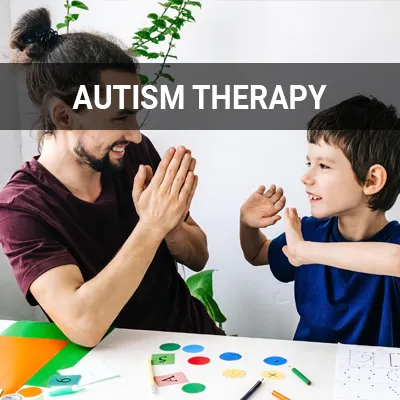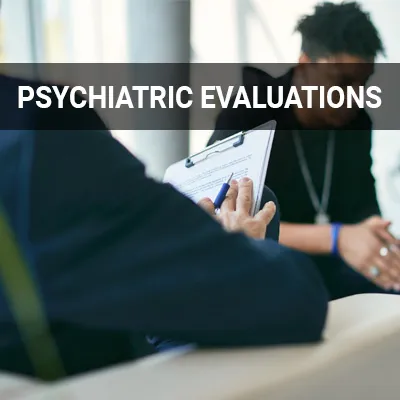Autism Evaluation Columbia, MD
An autism evaluation is a comprehensive assessment that involves observation, interviews, and various tasks to determine whether a child has autism. During the process, professionals observe a child’s social skills, communication, and behavior to develop an accurate diagnosis. Conducting an autism evaluation is a crucial part of getting patients the timely treatment they deserve.
If you are concerned about your child’s development or think they may have autism, do not hesitate to schedule an autism evaluation. Our team at Springs Health LLC in Columbia and the surrounding area conducts thorough evaluations to get your child access to the services they need. Call us today at (410) 772-0774 to learn more about our services or schedule an appointment.
Understanding Autism
Autism, also known as autism spectrum disorder (ASD), is a complex developmental disability that affects how a person socializes, communicates, develops relationships, and self-regulates. It is not a disease or illness but rather something that causes a person’s brain to function differently. The Centers for Disease Control and Prevention (CDC) reports that about one in 54 American children have autism. Difficulties with social skills, speech, nonverbal communication, and repetitive behavior patterns typically characterize this disorder.
Depending on the level of autism, a person's symptoms may adversely affect their ability to function properly at work, school, or other areas of life. Autism is a spectrum disorder, meaning that signs and symptoms vary in severity. People on different ends of the autism spectrum have distinct challenges and strengths. The way people with autism learn, think, and solve problems can vary greatly from being gifted to being severely challenged.
While some people with autism may need a significant amount of support and guidance, others can live independently. There are three levels of autism according to the DSM-5. Each level of autism differs in the degree of severity and need for support. While people with level one ASD may require some support, those in the third level need much more help and have significant social interaction and communication difficulties.
“Autism, also known as autism spectrum disorder (ASD), is a complex developmental disability that affects how a person socializes, communicates, develops relationships, and self-regulates.”
The Autism Evaluation Process
As psychiatrists, we can evaluate patients for autism disorder. Autism evaluations typically occur after a child has received a developmental screening test. If the child fails their screening test, an evaluation is the next step to determine a potential diagnosis. Since autism is a behavioral disorder, no brain scan or genetic test can determine a diagnosis. While there are various ways to conduct an autism evaluation, a comprehensive one will incorporate multiple formal and informal sources. One core element of an autism evaluation is the parent interview which gathers information about their child’s prenatal, medical, family, and developmental history.
It is also important to review the child’s interests and play skills during early childhood since it can reveal a pattern of what to expect in the future. The evaluation may also include questionnaires, tests, and observations of the child in a natural setting, such as home or school. Information from teachers or daycare attendants can also provide valuable insight into a child’s behavior. There are many different rating scales that parents and teachers may fill out to compare a child’s behavior with their peers. The Autism Diagnostic Observation Schedule, Second Edition (ADOS-2), is considered the gold-standard tool to evaluate autism.
It consists of various structured and semi-structured tasks that involve interaction and communication between the examiner and the person under assessment. Additionally, the evaluation can include a formal assessment of a child's cognitive abilities and adaptive functioning to disqualify the possibility of an intellectual disability. This process can also involve various speech and language assessments to determine language delay or impairment, one of the key indicators of autism. Some of the possible screening tests include the:
- Autism Diagnosis Interview-Revise
- Childhood Autism Rating Scale (CARS)
- Clinical Evaluation of Language Fundamentals (CELF-5)
- Expressive Vocabulary Test–third edition
- Gilliam Autism Rating Scale (GARS)–second edition
- Peabody Picture Vocabulary Test–V (PPVT-V)
- Preschool Language Scale–fifth edition
“One core element of an autism evaluation is the parent interview which gathers information about their child’s prenatal, medical, family, and developmental history.”
Possible Signs of Autism
Since autism is a spectrum, the number and severity of a person’s symptoms can vary widely. Every person is different, and not everyone with autism will display every symptom. Even those without autism may show some of the same behaviors as people with the disorder. This is why professional evaluation is crucial. Children and adults with autism typically face challenges with communication, emotions, and social interactions. They may also process sensory information differently. There are certain signs of autism that appear by age. While some children may display signs as early as a few months, others may show signs as late as two or three years old.
There are different signs at each level of the autism spectrum. Signs of the first level of autism are mild since people with this type are considered high-functioning. People with level 1 ASD have difficulty communicating properly with others since it can be challenging for them to read social cues and body language. They can speak in full sentences but may have trouble making friends, engaging in conversation, and being organized and flexible with changes. Some signs of the second level of autism include difficulty redirecting their focus. People with level 2 ASD struggle with nonverbal communication and typically have very narrow interests and repetitive behavioral patterns.
Finally, signs of the most severe form of autism, level 3 ASD, include extreme difficulty with verbal and nonverbal expression, making interactions or changes challenging. People with this level of autism will have a limited ability to speak intelligibly and rarely initiate interactions. Parents concerned about their child's development or suspect that their child may have autism should contact our team for an autism evaluation as soon as possible.
“https://rondevpediatricdentist.dgd3v.com/”
Check out what others are saying about our mental wellness on Yelp: Autism Evaluation in Columbia, MD
Creating a Customized Therapy Experience
Although there is no cure for autism or way to prevent it, there are treatment options available. Early evaluation and intervention are crucial as they can help improve behavior, skills, and development. Still, intervention can be helpful regardless of age. Most children do not outgrow symptoms of ASD, but they can learn how to function productively. Therapy and other treatment alternatives can help people with ASD minimize and manage their symptoms. Possible treatments include medications, along with behavioral, play, occupational, physical, and speech therapy.
An autism evaluation allows psychiatrists to determine a patient’s strengths and weaknesses with communication. The assessment helps us characterize the specific parts of speech, language acquisition, and skills that define the areas of concern for each person. This information allows us to design a personalized treatment plan to meet each person at their level. Taking an individualized and multidisciplinary approach to autism treatment is ideal since every patient is different.
While one patient may require little to no therapy, others may require more intensive treatment. We take the patient’s history, disorder severity, and any comorbid conditions into account when developing the appropriate plan to target specific symptoms. Developing customized therapies can help improve their social functioning, learning, and quality of life. Our team works with each patient to determine the most effective treatment plan for their needs.
“Early evaluation and intervention are crucial as they can help improve behavior, skills, and development.”
Questions Answered on This Page
Q. What is the autism spectrum?
Q. What is the autism evaluation process?
Q. What are the possible signs of autism?
Q. What is the importance of creating a customized therapy experience for patients?
Q. How can patients build a healthy lifestyle outside of therapy?
People Also Ask
Building a Healthy Lifestyle Outside of Therapy
While therapy is crucial for people with autism, it is just as important to build a healthy lifestyle outside of treatment. Certain exercises and sports can help people alleviate their stress and frustrations while promoting their overall well-being. We encourage clients to engage in any type of exercise they enjoy. It is best to incorporate physical activity gradually, so the change is not too abrupt or uncomfortable. Simply walking or playing at the park are both ideal ways to help children outside of therapy.
Sensory play activities such as swimming can also help people who have difficulty processing signals produced by their senses. Engaging in such physical activity can reduce stress, foster better sleep, and minimize uncomfortable symptoms and behaviors. Additionally, diet plays an important role for individuals with autism. Since specific patterns and aversion to change often characterize autism, people can develop unhealthy eating habits. We recommend substituting unhealthy food options for healthier ones and incorporating foods that can impact behavior positively. Small but positive lifestyle changes can go a long way in improving a person’s quality of life with autism.
“While therapy is crucial for people with autism, it is just as important to build a healthy lifestyle outside of treatment.”
Frequently Asked Questions
Q. What causes autism?
A. There is no single cause of autism. A combination of genetic and environmental factors can affect developing brains and contribute to ASD. There is ongoing research on genes that may play a role in developing autism and regions of the brain that connects to the disorder. Additional studies are exploring whether genetic and environmental factors can contribute to structural abnormalities in the brain. Faulty immune responses to a virus, excessive stress during pregnancy, and certain neurotransmitters such as serotonin, dopamine, and epinephrine may also contribute to the development of autism.
Q. Is there a connection between autism and vaccines?
A. No, vaccines do not cause autism. Vaccines are a crucial aspect of public health, protecting people from diseases. This false belief originated from a 1998 study that suggested the Measles, Mumps, and Rubella (MMR) vaccine might cause autism. However, the research from this study was proven to be false. Sometimes children can have adverse reactions to vaccines, such as a rash or fever, but there are no links between vaccination and autism. Forgoing or delaying vaccinations is risky as children can contract a preventable disease.
Q. What are the benefits of early intervention for autism?
A. Early intervention is a treatment for children from birth to age three. Teaching young children language and social skills in the early years of life, when their brains are the most flexible, produces quicker and stronger results than when introduced later. Early intervention can reduce the symptoms of ASD, improve independence, and reduce the need for intensive long-term support. We recommend having an autism evaluation as soon as a parent suspects their child may have autism so they can receive prompt treatment.
Q. Are certain groups more likely to have ASD?
A. Autism happens equally in all social, ethnic, and racial groups. Some groups with a higher risk of ASD are boys, siblings of people with autism, and people with certain disorders, such as Fragile X syndrome. The male to female ratio for ASD is about 3:1. Since certain genes and environmental interactions can make a person more likely to have autism, people with a family history are more at risk for ASD. Mutations in the MFR1 gene cause fragile X syndrome and are also associated with about 5% of autism cases.
Q. Can a person develop autism later in life?
A. No, for children to qualify for autism, they must have symptoms that appear during early childhood. Older children, teens, and adults do not develop autism. It is common for people with high-functioning autism and girls not to receive an accurate diagnosis when they are younger. This can sometimes lead to people believing they developed autism as they got older.
Change Is Possible – Call Us Today
Life isn't always easy. Are you struggling? Are you looking for a highly personalized and professional approach tailored to your individual needs? Instead of waiting around, call us today. You should know that there is hope for a better tomorrow.
Definitions
Call Us Today
A comprehensive autism evaluation is crucial in determining an accurate diagnosis and curating a personalized treatment plan. Our team at Springs Health LLC is here to help. Call us today at (410) 772-0774 to learn more about our services or schedule an appointment.
Helpful Related Links
- Agency for Healthcare Research and Quality. Agency for Healthcare Research and Quality. 2023
- American Psychiatric Association (APA). American Psychiatric Association (APA). 2023
- Psychology Today. Psychology Today. 2023
- The American Board of Professional Psychology. The American Board of Professional Psychology. 2023
- The American Journal of Psychology. The American Journal of Psychology. 2023
- The National Association of Behavioral Healthcare. The National Association of Behavioral Healthcare. 2023
About our business and website security
- Springs Health LLC was established in 2021.
- We accept the following payment methods: American Express, Cash, Discover, MasterCard, and Visa
- We serve patients from the following counties: Howard County
- We serve patients from the following cities: Columbia, Clarksville, North Laurel, Ellicott City, and Savage
- National Provider Identifier Database (1689198350). View NPI Registry Information
- Norton Safe Web. View Details
- Trend Micro Site Safety Center. View Details
Back to top of Autism Evaluation








